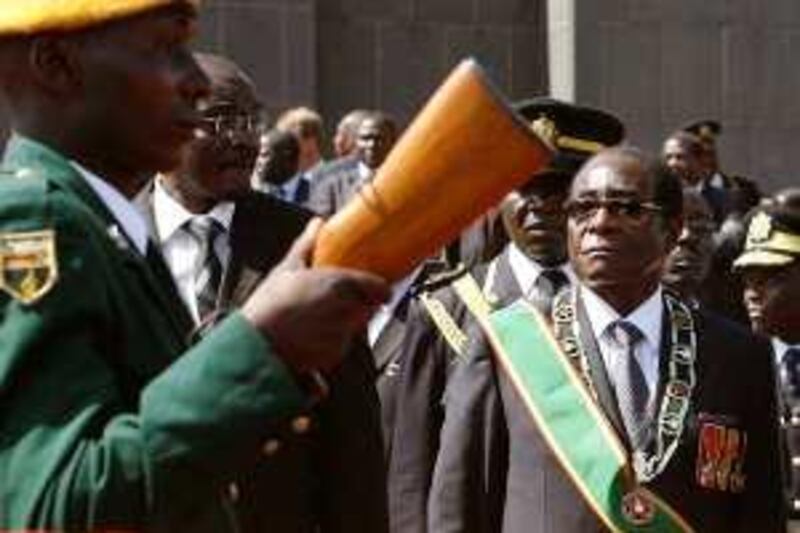HARARE // Robert Mugabe, 85, the president and leader of Zanu-PF, is on course to securing a fresh five-year term as party leader. The recent endorsement of nine out of 10 provincial committees ensures he will be the sole candidate for the presidency at the party congress in December. Mr Mugabe has been the president and first secretary of Zanu-PF for 33 years and head of state and government for 29 years. In terms of the party's constitution, he must secure the support of six provinces to get a new term. Given the support he has pre-congress, and barring unforeseen events, he will be 90 when his tenure as the party's head expires. Ibbo Mandaza, former chairman of the Southern Africa Political Economy Series Trust, said Zanu-PF's failure to renew its leadership could precipitate its downfall. He said Mr Mugabe's advancing age and the taxing demands of running a country together with younger competitors in the unity government could put a strain on him. "The endorsement of his leadership shows that there is no one in Zanu-PF who is prepared to challenge him," Mr Mandaza said. "That will precisely lead to the demise of Zanu-PF as a party. This means the Movement for Democratic Change (MDC) is likely to come to power by default. If Zanu-PF had resolved the succession of Mugabe, it could have stood some chance. But as long as he remains, the MDC is stronger." Mr Mandaza, who has a doctorate in political science, and Simba Makoni, a former senior member of Zanu-PF, left the party last year because of frustration over problems regarding leadership renewal in the former liberation movement. Endorsing the veteran leader's leadership, loyalists described their support in Mr Mugabe as "unshakeable" and said he was a "supreme leader" and "principled revolutionary". "We as Zanu-PF Manicaland province have agreed unanimously to endorse the candidature of Comrade Robert Mugabe to remain in charge of our party affairs and the nation," Bezel Nyabadza, the provincial party chairman, said recently. "President Mugabe has remained resolute and steadfast despite his persecution and vilification by the former colonial power Britain and her allies. Zanu-PF requires a steadfast, tried and tested leadership in the name of Comrade Robert Mugabe to steer the country out of the turbulent environment." The support he has received from Bulawayo, Masvingo, Manicaland, Mashonaland Central, Matabeleland South, Mashonaland West, Midlands, Matabeleland North and Harare provinces means there will be no contest for his job at the party congress. This apparent unity, said Eldred Masunungure, chairman of Mass Public Opinion Institute, a political think-tank, masks factionalism, which he said has divided the party into two groups - one led by Solomon Mujuru, an influential retired army general, and the other that supports Emmerson Mnangagwa, the minister of defence. "It is common knowledge that the factions exist," said Mr Masunungure, also a political science professor at the University of Zimbabwe. "I do not know why they appear to have closed ranks this time around, a time when we thought they want to renew their leadership." McDonald Lewanika, co-ordinator of Crisis in Zimbabwe Coalition, a civic organisation, said there is a crisis of leadership in Zanu-PF. "It is largely a party in crisis," Mr Lewanika said. "When you find yourself continuing to revert to the same leadership every time when there is a chance for renewal, you must know you have a crisis." He agreed with Mr Mandaza that MDC has a better chance of winning the next election against an unreformed Zanu-PF. "Results of the March 2008 elections showed that Mugabe as a brand does not sell," Mr Lewanika said. In the election, Mr Mugabe lost to the MDC leader, Morgan Tsvangirai, by more than 100,000 votes. But Mr Tsvangirai failed to garner more than 50 per cent of the valid ballots, so a second vote was held the following June. Mr Mugabe won the re-run by two million votes after Mr Tsvangirai withdrew, claiming political violence targeting his supporters. The men formed a unity government in February with Mr Mugabe retaining the presidency and Mr Tsvangirai becoming the prime minister.
Mugabe set to secure fresh term as party leader
Robert Mugabe, 85, the Zimbabwe president and leader of Zanu-PF, is on course to securing a fresh five-year term as party leader.

Editor's picks
More from the national




